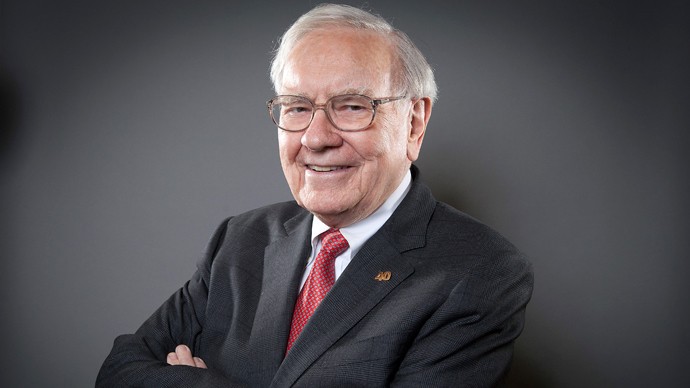Warren Buffett reveals 5 rules for investing in annual letter to shareholders
Post on: 22 Июнь, 2015 No Comment

Games are won by players who focus on the playing field — not by those whose eyes are glued to the scoreboard
Warren Buffett, Sir John Templeton, Peter Lynch: Mastering the stock market can seem daunting, but one short cut is to learn from the masters. Read on
Warren Buffett, the billionaire chairman of Berkshire Hathaway Inc. cited a farm he’s owned since 1986 to caution individuals against frequent buying and selling of stocks.
Investors should treat their equity holdings like real estate purchases, focusing on the potential for profits over time rather than short-term price fluctuations, Buffett, 83, wrote in an excerpt from his annual letter published on the website of Fortune magazine Monday .
“Those people who can sit quietly for decades when they own a farm or apartment house too often become frenetic when they are exposed to a stream of stock quotations,” Buffett said. “For these investors, liquidity is transformed from the unqualified benefit it should be to a curse.”
Buffett has pursued a buy-and-hold investment approach as he built Omaha, Nebraska-based Berkshire into a $280 billion company accumulating the largest holdings of Coca-Cola Co. American Express Co. and Wells Fargo & Co. He’s said individual investors may be better off avoiding his approach to picking stocks, instead purchasing a fund that holds every company in the Standard & Poor’s 500 Index.
“The goal of the nonprofessional should not be to pick winners,” Buffett wrote. “The ‘know-nothing’ investor who both diversifies and keeps his costs minimal is virtually certain to get satisfactory results.”
Buffett bulleted five fundamentals of investing, paraphrased here by Business Insider:
- You dont need to be an expert in order to achieve satisfactory investment returns. But Buffett also warns that the investor should recognize her limitations and keep things simple.
- Focus on the future productivity of the asset you are considering. Buffett notes that no one can perfectly forecast the future profitability of an investment. [O]mniscience isnt necessary; you only need to understand the actions you undertake.
- If you instead focus on the prospective price change of a contemplated purchase, you are speculating. Buffett has nothing against price speculation. But he emphasizes that its important to be able to know the difference between investing for the productivity of the asset versus investing on hopes that the price of the asset changes.
- With my two small investments, I thought only of what the properties would produce and cared not at all about their daily valuations. Games are won by players who focus on the playing field — not by those whose eyes are glued to the scoreboard. If you can enjoy Saturdays and Sundays without looking at stock prices, give it a try on weekdays. In other words, focus on the long-run.
- Forming macro opinions or listening to the macro or market predictions of others is a waste of time. Indeed, it is dangerous because it may blur your vision of the facts that are truly important. So mute CNBC, Bloomberg TV, and Fox Business. Unless Warren Buffett comes on.
The S&P 500 has returned about 7% annually over the past decade, beating by almost a percentage point the average yearly advance of Buffett’s company. Buffett has said he aims to increase Berkshire’s book value, a measure of assets minus liabilities, more rapidly than the S&P 500.
Retail Property
Buffett’s track record of profitable stock picks and takeovers has helped make his letters a must-read on Wall Street. The billionaire has said he writes them to be understood by his sisters, who don’t work in finance. The full document will probably be released by March 1, along with financial results for 2013.
In Monday’s excerpt, Buffett cited the agricultural holding and a 1993 investment in New York City real estate. Annual distributions on the retail property, near New York University, now exceed 35% of the initial investment.
He purchased the 400-acre farm, located 50 miles north of Omaha, for $280,000 in 1986. He says he calculated the farm’s return to be about 10%, based on production estimates for soy and corn. The farm is worth about five times what Buffett paid, and earnings have tripled, he wrote.
The billionaire compared the daily fluctuations in stock values to an erratic neighbour standing near his property, yelling out offers for the land.
‘Moody Fellow’
“If a moody fellow with a farm bordering my property yelled out a price every day to me at which he would either buy my farm or sell me his — and those prices varied widely over short periods of time depending on his mental state — how in the world could I be other than benefited,” Buffett wrote. “If his daily shout-out was ridiculously low, and I had some spare cash, I would buy his farm. If the number he yelled was absurdly high, I could either sell to him or just go on farming.”
That’s not how equity holders often react, Buffett said.
“Owners of stocks, however, too often let the capricious and irrational behavior of their fellow owners cause them to behave irrationally,” he wrote. “Because there is so much chatter about markets, the economy, interest rates, price behavior of stocks, etc. some investors believe it is important to listen to pundits — and, worse yet, important to consider acting upon their comments.”














